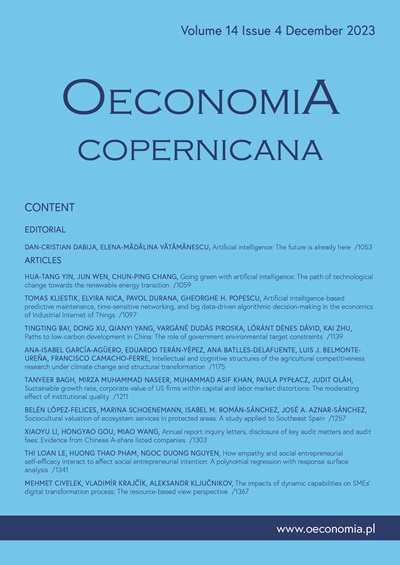欧洲联盟的经济增长和劳动力市场:新冠肺炎的教训
IF 10.8
1区 经济学
Q1 ECONOMICS
引用次数: 18
摘要
研究背景:自2020年3月以来,世界一直在与COVID-19引起的新型大流行作斗争。随后对经济活动的限制导致供应冲击,伴随着供应链中断、裁员、工作时间和工资减少、可支配收入和税收减少,从而导致需求冲击。然而,在2019冠状病毒病大流行期间,确诊病例数、死亡人数和经济指标之间是否存在密切联系仍不确定。本文的目的:本研究旨在分析欧洲联盟成员国感染和死亡人数对经济增长和劳动力市场指标的影响。方法:为实现主要研究目标,对2020年季度数据进行面板数据分析。具体来说,我们开发了三个随机效应面板数据计量经济模型来估计感染率和死亡率对经济增长以及就业和失业率的重要性。研究结果和附加价值:本研究通过分析COVID-19感染率和死亡率之间的联系以及选择欧盟内部的宏观经济指标,对现有文献做出了贡献。结果表明,感染率不是经济增长和劳动力市场指标的重要变量。然而,确诊死亡人数的增加对经济产生了严重的负面影响。此外,死亡率上升对劳动力市场的影响比对总体经济增长的影响更大。这些结果可以作为未来研究流行病与宏观经济指标之间相互关系的理论基础。调查结果还有助于制定有效的政策工具,以减轻未来流行病的负面影响,从而确保财政、货币和卫生政策当局的合作。本文章由计算机程序翻译,如有差异,请以英文原文为准。
Economic growth and labour market in the European Union: lessons from COVID-19
Research background: The world has been fighting the new pandemic caused by COVID-19 since March 2020. The subsequent restrictions on economic activity resulted in a supply shock, accompanied by a supply chain disruption, job layoffs, reduced work time and wages and decreased disposable incomes and taxes, which led to a demand shock. However, whether a close link exists between the number of confirmed cases, deaths and economic indicators during the COVID-19 pandemic remains uncertain.
Purpose of the article: The current study aims to analyse the impact of the number of infections and deaths on economic growth and labour market indicators in the member states of the European Union.
Methods: To achieve the main research goal, we conduct a panel data analysis on the quarterly data of 2020. Specifically, we developed three random-effects panel data econometric models to estimate the significance of infection and mortality rates for economic growth as well as employment and unemployment rates.
Findings & value added: This study contributes to the existing literature by analysing the link between the infection and mortality rates of COVID-19 and selecting macro-economic indicators within the European Union. The results show that the infection rate is not a significant variable for economic growth and labour market indicators. However, an increase in the number of confirmed deaths has a significantly negative impact on the economy. Moreover, an increase in the mortality rate has a worse impact on the labour market than on economic growth in general. These results can serve as a theoretical basis for future research on the interconnections between pandemics and macro-economic indicators. The findings can also contribute to developing efficient policy instruments for mitigating the negative impact of pandemics in the future, thereby ensuring the cooperation of fiscal, monetary and health policy authorities.
求助全文
通过发布文献求助,成功后即可免费获取论文全文。
去求助
来源期刊

Oeconomia Copernicana
ECONOMICS-
CiteScore
13.70
自引率
5.90%
发文量
26
审稿时长
24 weeks
期刊介绍:
The Oeconomia Copernicana is an academic quarterly journal aimed at academicians, economic policymakers, and students studying finance, accounting, management, and economics. It publishes academic articles on contemporary issues in economics, finance, banking, accounting, and management from various research perspectives. The journal's mission is to publish advanced theoretical and empirical research that contributes to the development of these disciplines and has practical relevance. The journal encourages the use of various research methods, including falsification of conventional understanding, theory building through inductive or qualitative research, first empirical testing of theories, meta-analysis with theoretical implications, constructive replication, and a combination of qualitative, quantitative, field, laboratory, and meta-analytic approaches. While the journal prioritizes comprehensive manuscripts that include methodological-based theoretical and empirical research with implications for policymaking, it also welcomes submissions focused solely on theory or methodology.
 求助内容:
求助内容: 应助结果提醒方式:
应助结果提醒方式:


